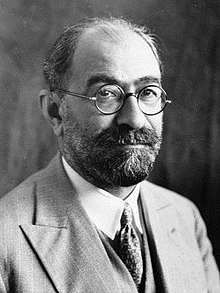Mohammad-Ali Foroughi
| Mohammad-Ali Foroughi محمدعلی فروغی ذكاءالملک |
|
|---|---|
 |
|
| 35th, 38th & 42nd Prime Minister of Iran | |
|
In office 27 August 1941 – 9 March 1942 |
|
| Monarch |
Reza Shah Mohammad Reza Shah |
| Preceded by | Ali Mansur |
| Succeeded by | Ali Soheili |
|
In office 18 September 1933 – 3 December 1935 |
|
| Monarch | Reza Shah |
| Preceded by | Mehdi Qoli Hedayat |
| Succeeded by | Mahmoud Jam |
|
In office 1 November 1925 – 13 June 1926 |
|
| Monarch | Reza Shah |
| Preceded by | Rēzā Pahlavi |
| Succeeded by | Mostowfi ol-Mamalek |
| Personal details | |
| Born | 1877 Tehran, Iran |
| Died | 26 November 1942 (aged: 65) Tehran, Iran |
| Political party | Revival Party |
| Children | 6 |
| Alma mater |
Tehran School of Political Sciences Dar ul-Funun |
Mohammad Ali Foroughi Zoka-ol-Molk (1877 – 26 November, 1942) (Persian: محمدعلی فروغی ذكاءالملک) was a teacher, diplomat, writer, politician and Prime Minister of Iran.
Foroughi was born in Tehran to a merchant family from Isfahan. His ancestor, Mirza Abutorab was the representative of Isfahan in Mugan plain during Nader Shah Afshar's coronation. His grandfather, Mohammad Mehdi Arbab Isfahani, was amongst the most influential merchants of Isfahan and was skilled in history and geography. His father Mohammad Hosein Foroughi was the translator of the Shah from Arabic and French. He was also a poet and published a newspaper called Tarbiat. Naser al-Din Shah Qajar nicknamed Mohammad Hosein, Foroughi, after hearing a poem that he had written. Many sources alleged that Foroughi's ancestors were Baghdadi Jews who came to Isfahan and converted to Islam. During occupation of Iran in the second world war, Nazi Germany often emphasized this alleged Jewish ancestry in radio broadcasts. During his early life, Foroughi studied at the élite Dar ul-Funun (House of Sciences) in Tehran.
In 1907, Foroughi's father died, and thus Foroughi inherited his father's title of Zoka-ol-Molk. During the same year, Foroughi became the dean of the College of Political Sciences. In 1909, he entered politics as a member of Majlis (Parliament), representing Tehran. He subsequently became speaker of the house and later minister in several cabinets as well as prime minister three times and once as the acting prime minister when Reza Khan resigned as prime minister to take up the crown as Reza Shah. In 1912, he became the president of the Iranian Supreme Court. Later he was appointed prime minister and dismissed in 1935 due to the father of his son-in-law's, Muhammad Vali Asadi, alleged participation in the riot in Mashhad against the reforms implemented by Reza Shah.
...
Wikipedia
